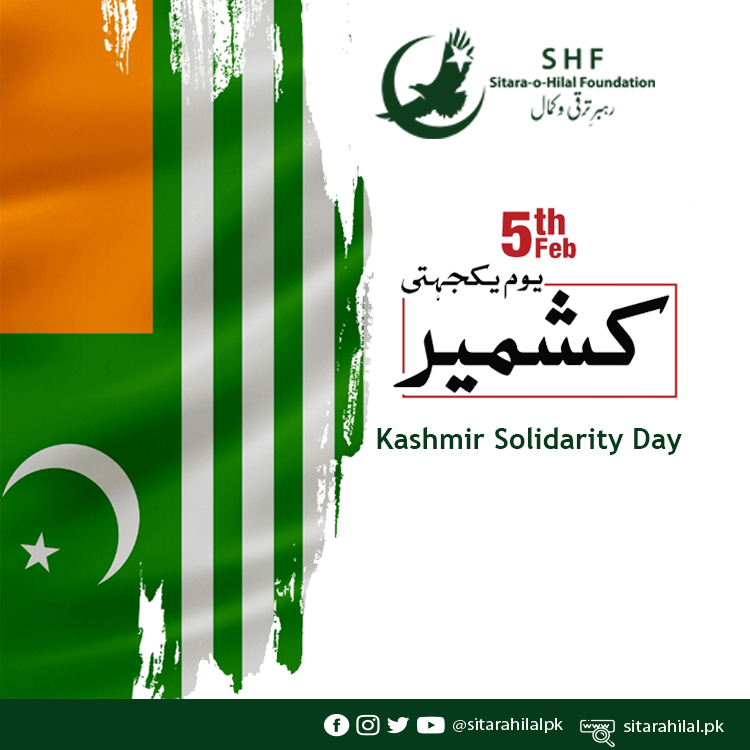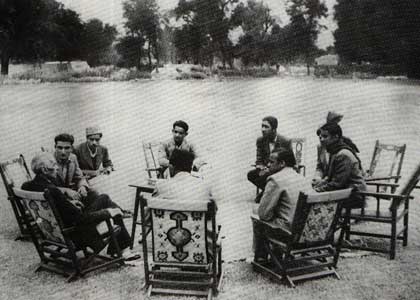Kashmir Solidarity Day and Quaid-i-Azam
Quaid’s vision on Kashmir is unequivocal. Quaid knew very well the importance and significance of Kashmir for Pakistanis as well as for Kashmiris. Quaid paid attention to the miserable conditions of Kashmiris even when there was no one to listen their cries. Quaid vociferously condemned the Indian aggression on Kashmir. He wanted the peace full settlement of the dispute but he was also determined to go to any extent to free Kashmir from Indian clutches, which is evident from his bold step to issue orders to the Commander-in-Chief of Pakistan Army General Gracey to dispatch troops to Jammu and Srinagar. Unfortunately, owing to mystifying reasons, Quaid’s historic and revolutionary decision was not implemented.

Quaid-e-Azam believed that without Kashmir Pakistan is incomplete. He tried his best to use all the means to free Kashmir from Indian illegal occupation. Quaid’s commitment with Kashmir and Kashmiri people was unshakeable. On the basis of Quaid’s vision on Kashmir, today we also need to design a concrete national policy on Kashmir and successive governments should follow it consistently.
According to Dr. Riaz Ali Shah’s Diary, Quaid-e-Azam said, during his illness in Ziarat, “Kashmir is the Jugular vein of Pakistan and no nation or country would tolerate that its Jugular vein remains under the sword of the enemy”. Not only the Jugular vein of Pakistan but also that of Kashmiri community in particular has been under the sword of the enemy for the last fifty years. Quaid e Azam supported the Kashmir cause even before the independence. Quaid’s three visits to Kashmir showed that he had deep interest in Kashmir and politics of Kashmir. He desired that Kashmiris especially Muslims should get there socio-economic rights and justice. Quaid-e-Azam’s interest in Kashmir is evident from the fact that he explained the significance of the name of Pakistan to Mountbatten on 17 May 1947 as “The derivation of the word Pakistan – P for Punjab; A for Afghan (i.e. Pathans NWFP); K for Kashmir; I for nothing because that letter was not in the word in Urdu; S for Sindh and Tan for the last syllable for Baluchistan.
Quaid-e-Azam supported the Kashmir cause even before the independence of Pakistan. It was his desire that Kashmiris especially Muslims should get their socio-economic rights and justice. During the period of Dogra Raj in Kashmir Muslims were dealt in very cruel manner, women were treated like herd of animals. In 1926 when Quaid visited Kashmir he came to know that Kashmiri Muslim sent a delegation to the then viceroy and submitted a memorandum to take notice of the miseries of Kashmiri people. That delegation when returned they were tortured, their lands were snatched. When Quaid came back, a unanimous resolution was passed in the meeting of Muslim League at Lahore, which addressed maharaja to take care of the educational and economic rights of the Muslims. Allama Iqbal was also on the same footings as Quaid, taking notice of the maltreatment of Kashmiris, in 1931 president of Muslim League Allama Iqbal declared that Muslims of Sub continent should observe 14 August as the Kashmir day.
Quaid’s three visits to Kashmir show that he had deep interest in Kashmir and its politics. Regarding Srinagar visit of the Quaid-e-Azam in 1944, Alastair Lamb says” M.A. Jinnah, unlike Jawaharlal Nehru was extremely reluctant at this period of time to involve himself directly (or the Muslim League which he headed) in the internal affairs of the Princely State; such action would in his eyes have been constitutionally improper.
India by hook or by crook was eager to get hold of Jammu and Kashmir. ‘Two-Nation Theory’ is the basis of the Ideology of Pakistan but Indian Hindu leaders tried their best to negate it. They attempted to impact Quaid-e-Azam with the goal that he may leave his stand on ‘Two-Nation Theory’ but he remained rock-solid on his position.
Quaid was man of principles and a realist. Quaid succeeded because of his commitment and firm belief in mission of Pakistan and we need the same. Deviation from Quaid’s vision will be extremely detrimental to the stability of Pakistan.

